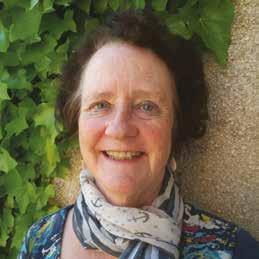
Sunderland players and fans look forward to the start of the Premier League



Sunderland players and fans look forward to the start of the Premier League

The Salvation Army is a Christian church and registered charity seeking to share the good news of Jesus and nurture committed followers of him. We also serve people without discrimination, care for creation and seek justice and reconciliation. We offer practical support and services in more than 700 centres throughout the UK. Go to salvationarmy.org.uk/find-a-church to find your nearest centre.
The Salvation Army first published a newspaper called the War Cry in London in December 1879, and we have continued to appear every week since then. Our name refers to our battle for people’s hearts and souls as we promote the positive impact of the Christian faith and The Salvation Army’s fight for greater social justice.
Editor: Andrew Stone, Major
Deputy Editor: Philip Halcrow
Staff Writer: Emily Bright
Staff Writer: Claire Brine
Staff Writer: Ewan Hall
Editorial Assistant: Linda McTurk
Graphic Designer: Mark Knight
Graphic Designer: Natalie Adkins
Email: warcry@salvationarmy.org.uk
The Salvation Army
United Kingdom and Ireland Territory
1 Champion Park London SE5 8FJ
Tel: 0845 634 0101
Subscriptions: 01933 445445 (option 1, option 1) or email: subscriptions@satcol.org
Founders: Catherine and William Booth
International leaders: General Lyndon Buckingham and Commissioner Bronwyn Buckingham Territorial leaders: Commissioners Jenine and Paul Main
Editor-in-Chief: Major Julian Watchorn
The Salvation Army
0043-0226
The Salvation Army Trust is a registered charity. The charity number in England, Wales and Northern Ireland is 214779, in Scotland SC009359 and in the Republic of Ireland CHY6399.
How do you spend your time in the summer? Is it a season for slowing down, relaxing and going on holiday, or does it involve some of the most frantic weeks of the year?
Most people would probably agree that it does them good to have a time when life becomes a little less hectic. But for parents of children in education, the summer can be the busiest time of year, because schools close and they need to look after and amuse their offspring every day.
The summer holidays can also be a stressful time for parents with a limited income, particularly if they have to find money for meals that their children usually receive for free at school. In this week’s we meet a single mum who was helped through these challenges by The Salvation Army.
Now we have reached the midpoint of August, some activities that were on pause are springing into life again. Schools in Scotland are about to open their doors for the start of a new academic year and, as we report, the Premier League kicks off this weekend, a fortnight after refs’ whistles sounded the start of many other leagues across the UK.
The hustle and bustle of everyday activities is beginning to stir again, and any slowdown we did enjoy in the summer may be about to disappear. However, if life is proving to be hard to handle, help is at hand.
Chaplain the Rev Dr Anne-Louise Critchlow has discovered the importance of slowing down in her life, so much so that she has written a book encouraging other people to do the same. This week she talks about her experiences, her book and how her faith helps her.
Slowing down in the busyness of life and giving some of that time to God is something that could help each one of us. It may not be easy to do, but if we give it a try, we’ll find that it’s time well spent.
by CKN Print, Northampton, on sustainably sourced paper


Your local Salvation Army centre






A display in the stands ahead of the play-off semi-final

As the new Premier League season gets under way, many supporters will feel that they have grounds to be excited – in Everton’s case, a literal new ground.

And while the top flight’s longest-standing club move into the Hill Dickinson Stadium, other clubs are looking forward to their return to the elite. Joining Burnley and Leeds, Sunderland are about to play their first game in the Premier League for eight years.
The Black Cats have been through some tough times in recent years, but have been clawing their way back. They gained promotion last season with late goals in the play-offs, the players and fans having appropriately adopted the motto ‘’Til the end’.
Throughout the promotion push, a group from a Salvation Army centre for people experiencing homelessness were playing a special part in match days – and are ready to go again. Staff and residents at Swan Lodge in the city have forged strong links with the club.
Support worker Andy Smith says: ‘At the beginning of last season Chris Waters, the club’s supporter liaison officer, put us in touch with This is Wearside, a fan-based group which is responsible for flags and
displays in the stands.
‘So myself and four or five residents began going over to the stadium with the seat plans and helping to put out the coloured plastics so that when fans raise them on match day, it creates an image –such as the ones for Remembrance Day and the play-off semi-final.
‘There’s a lot of hard work in getting the display ready, and as a reward we were getting tickets for the match.’
Then, Andy explains, the residents began playing an even bigger part on match days.
‘Chris asked how we would feel about being the official flag-bearing team for Sunderland Football Club.
‘So every home match, staff members go across to the stadium with residents, we stand pitchside and we’re responsible for waving the big flags before kick-off, when a goal is scored and at full-time.’
Andy’s analysis is that ‘getting the residents involved is massive’.
He says: ‘Isolation and boredom are big problems in terms of homelessness and battling mental health issues and addictions. So helping with the displays
and being the official flag-bearers at weekends gives the residents a sense of purpose and belonging.’
To acknowledge the contribution that Swan Lodge makes, the club took the playoff final trophy to the centre, where present and former residents, staff and supportive members of the community were given the chance to lift it.
Christine Ritchie, centre manager, sees how the connections with Sunderland AFC contribute to Swan Lodge’s work.
‘For the lads and lasses who do the flagbearing, it gives them self-worth,’ she says. ‘Their families see them in their role, so it gives them a huge boost. And for a couple of individuals last season it helped them with their addictions and their mental health, because they knew they had to be ready to be flag-bearers on Saturday.’
The link-up, she summarises, is assisting The Salvation Army at Swan Lodge to fulfil its role.
‘We need to find ways to get someone from A to B along the path of life,’ she says. ‘And if football helps them, it’s a way of showing them that they’re valued – it’s a way of showing them God’s love.’
A dating app has devised a new way to play Cupid, reported Alex Taylor in an article on the BBC website. Breeze matches potential partners but does not allow them to send messages back and forth before arranging a meeting – a process which many people reportedly find tedious.
Almost 10 per cent of Brits told a recent poll that they met their partner on a dating app, and online matches have become a less taboo way of meeting the love of your life. But, said Alex, research suggests an overwhelming number of daters have online burnout, ‘so it’s no wonder dating apps are trying to reignite the spark’.
Instant messaging has long been a feature in the lives of many people, especially millennials and younger generations. It is now used in almost every area of our lives – social, work, family, banking, shopping … and romance.
It’s increasingly difficult to avoid the use of technology
So Breeze’s removal of any messaging element (except to confirm the meeting and send any post-date comments) is seen as refreshing. After the date, the app asks each party whether they want to exchange contact details, a feature Alex appreciated.
‘I am unable to contact her again, but it gave closure,’ he wrote after the date with his first match. ‘No ghosting.’
Reflecting on this new approach to online dating, Alex added: ‘Sure, it didn’t work out this time for me and my date, but it felt much more human, less AI.’
Whatever our outlook on internet dating, it’s becoming increasingly difficult to avoid the use of technology when connecting with other human beings.
What’s on my mind is how to navigate the technological landscape as Jesus would. It’s hard for me to imagine the Messiah using an iPhone – and he wouldn’t have been on any dating apps – but I believe that if he were walking around the streets today, he would have used digital tools respectfully.
I think he would have seen anyone he interacted with as a person who had feelings, not a commodity to be blocked or ghosted at a whim. And he would have made every effort to value others, making all interactions feel less AI, more human.
The world’s consumption of media ‘is now framed by very large streaming companies who have the power and cash to shape our choices’ and ‘influence our world views’, the Bishop of Leeds argued in a Viewpoint article for Radio Times
After attending parliament for the launch of Behind the Screen, a report by the University of Leeds on how streaming is changing public service media, the Right Rev Nick Baines wrote of the damaging impact of removing specific references to religion and belief, the arts and international issues from the Media Act 2024.
He argued that ‘if we feed on rubbish’, the public may end up ‘out of shape and unfit to defend what really matters’. If viewers ‘are fed what is deemed by non-neutral algorithms only to appeal to our desires’, he said, then they could end up ‘as commodities to be exploited by those with money, power or ideological certainties’.
The bishop also highlighted how the BBC was the minority broadcaster in having ‘a place for religion and ethics’ in its programming and a team of people leading it.
‘Why does this matter?’ he asked. ‘If you don’t understand religion, you can’t understand the world we live in.’

Miranda Hart posted on Instagram that she was ‘moved and inspired’ after reading about the life of Jesus in Bear Grylls’s latest book, The Greatest Story Ever Told: An Eyewitness Account.
The comedy actress wrote: ‘I have always admired and respected Bear Grylls’s faith and how he explains the practical and emotional effects of it on his life. I loved this book – a wonderful way to read the story of Jesus afresh, and from a “normal”, simple way. Which made it more impactful.’
She added: ‘Whatever your faith tradition, the message of love is extraordinary. And whatever your faith tradition it is arguably the greatest story ever told.’
In an interview published in the War Cry last month, Bear said that writing the book enabled him to ‘share this beautiful story of love and redemption with millions of people around the world’.


The Salvation Army in Maidstone is holding worship sessions at a water sports centre.
Each Paddleboard Church event – which takes place in the Kent town’s Mote Park – commences with a Bible message and prayer, after which people are invited to enjoy paddleboarding, kayaking, rowing or using the pedalos.
Lieutenant Dave Perkins, co-leader of The Salvation Army in Maidstone, said that the congregation were keen to support the idea of a paddleboard ministry, which came from a church member and was launched two years ago.
‘This fun activity helps us to bring the community together in a different way to what you would usually expect from a church,’ says Dave. ‘Paddleboarding may not be as daunting as coming to church on a Sunday for some. It’s relaxed, joyful and a fresh way to connect with God whether you are stepping on to a board for the first time or the 50th.’

nRegular attendance at religious services strongly associates with greater wellbeing, Harvard University research has found.
US magazine Christianity Today reported that Harvard’s Global Flourishing Study, which worked with more than 200,000 adults across 22 countries, uncovered that people who attend services more often tend to report higher levels of happiness, purpose and social connection. The benefits appeared across various nations and cultures, suggesting that faith communities play a powerful role in helping people live more meaningful and fulfilling lives.
The Salvation Army has issued a statement calling for an end to conflicts in Gaza and elsewhere.
General Lyndon Buckingham, the international leader of the church and charity, which works in 134 countries, said in the statement: ‘Every life is sacred, and every act of violence leaves a scar on our shared humanity. As a people of faith and conscience, The Salvation Army calls for an immediate release of the remaining hostages and a sustained ceasefire [in Gaza] that ensures protection, security, support and a viable future for all people in the region.
‘We also recognise the human toll in conflicts in Sudan, the Democratic Republic of Congo, the Sahel region of Africa (including Burkina Faso and Mali), Syria, Myanmar, and in the Russo-Ukrainian war and elsewhere. We urge all parties in all conflicts to rethink their positions and, for the sake of their own people, to pursue pathways of peace, justice, reconciliation and healing.’
The General adds: ‘The protection of the innocent –especially children, the elderly and the vulnerable – must be paramount.’
















































Feature by Claire Brine
Catherine had a traumatic childhood.
Her mum struggled with alcoholism.
Her dad died when she was young. At the age of 13, she decided to place herself in foster care.
‘I lived in care until I was 19,’ she says. ‘Then I started my life again. But this time I was completely on my own.
‘Eventually I met someone, and we went on to have three children together. But due to a breakdown in our relationship, we separated.
‘He didn’t stick around. My children and I moved to a new area, but I found it difficult. At times, I felt lonely.’


Today Catherine and her children live in a ‘cosy three-bedroom house’ in Oldham – but life hasn’t been easy for them. Catherine has had to cope with a number of health problems. It was only

For some parents, the summer holidays can be a challenging time. Single parent Catherine found support for her children at a Salvation Army activity club






recently that she got the all-clear from cancer.
These health concerns have resulted in the family struggling financially.
‘My health problems meant that I haven’t been able to work, so I’m on universal credit,’ Catherine says. ‘But the payments just don’t stretch far enough. Once I’ve paid for my rent, bills and food, it’s a struggle to have anything left over for clothes that we may need.


to buy the additional food they need. She is grateful to find support from The Salvation Army, which runs a children’s activity club and caters for its participants at mealtimes.







‘Days out and treats are just not possible. The summer holidays are particularly tough.’
During term time, Catherine’s children are entitled to free school meals, but during the summer holidays, the family’s finances are pushed to the limit as Catherine tries to find enough money

Seeing their confidence grow is lovely


‘I t’s a real lifeline for us,’ she says.



‘Not only does it give my children something to do, but the club also ensures that they are fed at every session they attend. They’re given breakfast, lunch and snacks, which takes the pressure off me and my budgets on that day. My costs are kept to a minimum, which is a blessing in the school holidays






































































when other prices are going up.’
The club offers children the opportunity to take part in fun and educational activities. Catherine is relieved to know that her children are being well looked after.
‘They have enjoyed doing craft activities, gardening and taking part in different sports, such as archery and football,’ she says. ‘My children are being given experiences that they wouldn’t get with me. They’re able to get outside with other children, keep active, gain new skills and have lots of fun. As their parent, seeing their confidence grow is lovely.’
Catherine enjoys attending the activity club sessions herself and has made some new friends in her community.
‘It’s nice to be able to do something
as a family, but also for me to be around like-minded people,’ she explains.
‘Coming to The Salvation Army has got me out of the house.
‘Another good thing is that children over eight years old can attend a session on their own, so parents are being provided with additional childcare if they need it. Sometimes my eldest child, who is 10, has attended the activity club on her own, which has helped me massively. I’ve been able to stay at home and focus on my younger two, while she is growing in confidence.
‘I am comfortable in the knowledge that she is not stuck at home but is in a safe, contained environment, well fed and, above all, having fun.’
Though life as a single parent can be hard, Catherine is thankful for the
ways in which The Salvation Army has enabled her children to enjoy new experiences together. The friends she has made through the activity club have become like family.
‘When you don’t have family around and you’re on your own, it can be really isolating,’ she says. ‘But The Salvation Army has ensured we aren’t isolated or forgotten about. We can do things together, as part of a wider community.
‘The Salvation Army has changed our lives, and I’m so grateful for it. It has connected me to friendship groups and activities, promoted my mental health and allowed me to look forward to the future. Although I’ve moved around a lot in my life, I know that I’m here to stay.’
l Catherine’s name has been changed

STEVE MORGAN, the regional director for Europe at the Mission to Seafarers, explains how the charity’s global network of chaplains and volunteers offers a lifeline to sailors facing isolation, hardship and danger
Interview by Ewan Hall
Every day more than a million people navigate the world’s oceans, transporting goods and passengers. For many, the appeal of a working life on the waves lies in the opportunity to travel to remarkable destinations and enjoy a camaraderie with fellow crew members. Yet alongside these rewards come significant challenges, such as isolation, long contracts, limited shore leave and mental health concerns.

Since 1856, the Mission to Seafarers, a global Christian charity, has supported people who serve aboard various types of marine vessels. Operating in more than 200 ports across 50 countries, the organisation offers practical, emotional and spiritual help to all those working at sea, whether in or out of port.
‘The challenges that seafarers face


– loneliness, harsh conditions, low pay and little food – don’t change,’ says Steve Morgan, regional director for Europe at the Mission to Seafarers.
‘These issues persist. While some ships are improving, we step in to help those that are not.’
In the ports where the Mission to Seafarers operates, chaplains, welfare staff and volunteers are ready to help people of all faiths or none. Sometimes the support they provide is as simple as going up a gangway for a one-to-one conversation or buying people essential items like food or clothing.
‘The average seafarer’s contract is nine months,’ Steve explains. ‘We are increasingly finding that crews are not getting off their ships because they’re too busy while in port, with no time to disembark.


‘I was on a ship in Hong Kong a year ago, and the sailors on board were cold and hadn’t left the ship for six months. As a result, they couldn’t buy anything. One sailor was desperate for a onesie to keep him warm at night because the ship had no heating. We managed to locate one and buy it for him. It sounds simple, but the smile on his face when he received that onesie was priceless.’
Working at sea provides many sailors with significantly more income than they could earn at home. However, this doesn’t mean that they are free from exploitation. Pay conditions, limited shore leave and poor connectivity –especially the reduced ability to contact family – remain major challenges.
‘I was talking to a seafarer who had been at sea for most of his children’s lives,’ Steve says. ‘When he returned home, his seven-year-old daughter saw him and immediately ran away crying, hiding behind her mother because she didn’t recognise him. Yet he had been at sea earning money to support her.’
To support sailors worldwide, whether at sea or in port, the Mission to Seafarers provides assistance in any way it can – including by training
its personnel in suicide awareness and mental health support.
The mission’s website also offers a digital assistant to help those working at sea to access contact details for seafarer centres and to explore training programmes such as WeCare, which teaches financial wellbeing – important for sailors who are often the sole providers for large families – as well as social wellbeing.
We listen, we care and we pray
‘The most important initiative on the website is the Seafarers Happiness Index,’ says Steve. ‘It asks those working at sea around the world to answer questions such as: What ship are you on? What is your age range? How do you find your terms and conditions?’
The Mission to Seafarers uses these results to advocate for improvements in the shipping industry. For instance, it campaigns to ensure that the growing number of women at sea have properly fitting PPE and time to see their children.
‘Above all, we just listen, we care and
we pray,’ Steve adds.
Having served as a chaplain in the Royal Navy and the Church of England, Steve now leads the Mission to Seafarers’ chaplaincy across Europe. His role is diverse and global, taking him to places such as Russia, Turkey, the Falkland Islands and beyond. He supports a network of chaplains, branch managers and volunteers by fostering communication, encouraging good practice and respecting local autonomy.
Despite seafarers’ shared experience aboard ships, each location presents unique cultural and logistical challenges, making collaboration between the mission and the port essential.
Through everything he does with the Mission to Seafarers, Steve remains in awe at how God works in people’s lives.
‘What my life at sea and ministry has shown me is that when we work with God, and when God is working with us, it’s amazing,’ he says. ‘I have seen chaplains walk up gangways with the light of Christ in their eyes, meeting and speaking to seafarers. When I see the difference that the chaplain is making to someone’s life, I know that what we do is worthwhile.’




The Rev Dr ANNE-LOUISE CRITCHLOW, a volunteer chaplain who supports older people, reveals the value of slowing down, listening and prioritising what really matters
Interview
by Emily Bright
‘Slow down!’ warned a neon road sign which illuminated the night sky. All the drivers in the street, including the Rev Dr Anne-Louise Critchlow, paid it no attention. But when Anne-Louise woke up from her dream, she felt it was a prompt from God to take life at a slower pace: to spend more time with her family, to listen more to people in her community, and to take better care of her mental and physical wellbeing.
Anne-Louise recalls the dream in her new book, Slowing Down: Finding Beauty in the Slow Lanes of Life, which is the culmination of thoughts that she began jotting down 20 years ago. It charts the life lessons that she has learnt over that time.
‘When I had problems with my faith or I was feeling angry with God,’ she remembers, ‘I wrote in exercise books, just for myself, about what had annoyed me or what I’d found difficult.
‘Since then, I’ve encountered all sorts


of people who’ve had questions and difficulties in life. The honest journal I was keeping and my experience of meeting lots of people with questions came together.’
In writing Slowing Down, AnneLouise drew on her experiences of Christian ministry, her personal struggles and stories from the Bible to explore the power of everyday kindness as well as the importance of traits such as faithfulness, gratitude, contentment and courage.
‘I wanted to write about courage because we don’t know what’s going to happen in life,’ says Anne-Louise. ‘For instance, we can find that our status has changed from single to being married, or married to being single again because we’re widowed or we’ve had a divorce. At every point in life, we need courage, especially in something we haven’t experienced before.
‘Sometimes people find that they have to slow down through illness. Or if
someone has suddenly got to retire, they start thinking: “Have I got a purpose in life?” It requires courage to think that purpose isn’t just about doing the job that you’re good at.’
Anne-Louise’s own sense of purpose as a Christian is framed around her ‘knowing that God’s got something good for us now’.
In 2017, she took her own courageous step, retiring as a vicar to become a part-time chaplain for a housing and care home charity in Bristol.
‘It wasn’t something I expected to do,’ she says. ‘I’d been living in Manchester for many years, and, for family reasons, had vaguely thought about retiring in Bristol, where I live now. I’d assumed that I would carry on being a vicar.
‘Suddenly I saw this job in the South West as a chaplain. I began visiting people in care homes, asking whether they wanted me to pray for them, creating relaxed experiences of faith

with them.
‘I’d say: “We’re going to have some fun activities for our mind, body and spirit. If you want to join in, you can.” I found that people often wanted to talk about eternal things, and that was a wonderful privilege.
Not rushing in but just listening is important
‘S
taff would also get in touch with me – for instance, if they were worried about an illness they’d got. I ran a course about the basics of the Christian faith, and the ministry there had a far greater effect than I expected.’
A few years later, Anne-Louise began volunteering with the Anna chaplaincy, a Christian organisation which offers emotional and spiritual support to older people, particularly those living in care homes.
Listening well has been an essential part of Anne-Louise’s vocation as a vicar and now chaplain. But she also sees it as a valuable skill for anyone to learn.
‘Not rushing in with solutions but just listening is important,’ she explains. ‘Little things mean a lot to people – a phone call, a little card, or having a laugh with somebody.’
Another priority is taking time to pray. Anne-Louise encourages those who have never tried it before to give it a go.
‘If you’re wondering whether God exists, I recommend that you say: “God, I don’t know whether you’re around, but if you are, I’d like to know who you are.”
When you pray that prayer, unexpected things happen.’
Anne-Louise sees prayer as more than ‘just a crutch’. In her eyes it’s a line of communication to God and a source of strength, which can bring breakthrough. She says that it is worth doing regardless of how little time
someone can spare.
‘One of my children went through the most terrible experience of depression. I was also extremely busy with work and looking after four children,’ she recalls. ‘I got to the point where, even though I finished at 11 o’clock at night and wanted to go to bed, I needed time with God and for him to help me.
‘Prayer became a vital part of my day, and God is somebody I – or anyone else – can approach at any time.’

l Slowing Down is published by Instant Apostle
The War Cry invites readers to send in requests for prayer, including the first names of individuals and details of their circumstances, for publication. Send your Prayerlink requests to warcry@salvationarmy.org.uk or to War Cry, 1 Champion Park, London SE5 8FJ. Mark your correspondence ‘Confidential’.
There is no set formula to becoming a Christian, but many people have found saying this prayer to be a helpful first step to a relationship with God
Amos is prophesying to the northern kingdom of Israel during the reign of King Jeroboam II, some 20 to 40 years before the country is invaded by the Assyrians.
This is a time of great suffering for the people living in Israel (see 2 Kings 14:26). Neighbouring armies have destroyed their settlements (Amos 1:3), sold communities into slavery (1:6), killed men (1:11) and gutted pregnant women (1:13). But God will punish them.
Within Israel, there is injustice, idolatry and immorality (2:6–8). The nation refuses to acknowledge its covenanted relationship with God and has ignored his warning shots of hunger, drought, failed crops and plagues (4:6–10). People would rather make money than make time for worship, with traders cheating their customers and dealing in human misery (8:5 and 6).
Lord Jesus Christ,
I know that I have done things in my life that are wrong and I’m sorry. Thank you that I can ask you for forgiveness because of the sacrifice you made when you died on the cross.

Please forgive me and help me to live a better life in the future as I learn how to love you and follow your way of living.
Thank you, Lord Jesus.

God issues an ultimatum: repent. He tells them to stop worshipping at altars to false gods (5:5) and instead ‘seek the Lord and live’ (5:6 New International Version). Amos goes on to tell them that God sees that they are oppressing the poor (5:12) and wants them to start living godly lives (5:24). The alternative, he says, is punishment.
In a series of visions, Amos details the possible judgement. It could be as all-encompassing as a plague of locusts (7:1–3). It could be as allconsuming as a fire (7:4–6).
God measures Israel against a plumb line and declares it crooked (7:7–9). Divine retribution will come when the time is ripe (8:1–3).
The day of judgement will be characterised by natural disaster, darkness, famine, spiritual hunger and the destruction of the kingdom of Israel (8:8 to 9:10).
However, after the punishment, God will restore the nation. People will return from captivity. Towns will be rebuilt and land cultivated once more. Never again will Israel be uprooted (9:11–15).

If you’ve prayed this prayer, scan the QR code or contact us using the coupon on this page

























































To receive basic reading about Christianity and information about The Salvation Army, complete this coupon and send it to





War Cry 1 Champion Park London SE5 8FJ a





















Who scored England’s winning penalty in the Uefa Women’s Euro 2025 final? 1 2 3 4 5 6
Lili Myers has published a book in memory of her husband, Dave, who was one half of which cookery duo?
Who had a No 1 hit in 1985 with their song ‘I Want to Know What Love Is’?
Which new film sequel stars Lindsey Lohan as a teenager and Jamie Lee Curtis as her mum?
What is the longest river in the UK?
What was the name of Martin Crane’s dog in the US sitcom Frasier?

Feature by Ewan Hall
It’s time to smile and say cheese – World Photography Day is on Tuesday (19 August). To celebrate the art of capturing memories, telling stories and freezing a moment in time, organisers are encouraging people to share their best photos on social media using the hashtag #WorldPhotographyDay.
Since the early 19th century, photography has evolved from a scientific curiosity into a way in which people can share their life experiences at the touch of a button.
Other people’s photos invite us to see the world through their eyes. They offer glimpses into different perspectives and cultures. Old photographs give us a window into the past, showing us the fashion, places and people of another time.
Cameras have changed a lot since they were invented – from early light projection to the powerful cameras on our phones. And as photography has improved, so has our ability to edit pictures and use filters, which means that the old saying ‘the camera never lies’ doesn’t really apply any more – if it ever did.
On social media, many photos are changed to depict a perfect life, but that often hides the truth. To try to impress others, it can be tempting to upload images that project a life that doesn’t reflect reality.
In portraying our personal lives digitally, we may try to do away with any negatives – that is, with the insecurities we feel, the bad habits that we have and the times when life is not picture-perfect – because we worry that people will think less of us if we expose the problems we face.
However, we can’t hide anything from God. He sees us even when we are at our worst – but he loves us anyway. And he is willing to help us through the tough times that come our way, showing us the possibility of a brighter future.
By keeping God in our frame of reference, we can find the confidence to know that we are loved unconditionally – however life develops.

ACROSS
1. Relative by marriage (2-3)
5. Motionless (5)
8. Sufficient (5)
9. Oscillate (5)
10. Call on (5)
11. Very select (5)
12. Impudent (4)
15. Cloak (6)
17. Commonplace (5)
18. Additional levy (6)
20. Wail (4)
25. Naval force (5)
26. Follow (5)
27. Decree (5)
28. Evade (5)
29. Sharpened (5)
30. Rascal (5)
1. Foot part (6)
2. Idle (6)
3. Bet (5)
4. Mar (5)
5. Various (7)
6. Affront (6)
7. Small (6)

13. Australian bird (3)

Chart (3)
Statute (3)
Perplexed (7) 18. Grab (6)
19. Keep (6)
Excursion (6)
Sheen (6)
Object (5)
Guide (5) 14. Remiss (3)
HONEYC O M B

Each solution starts on the coloured cell and reads clockwise round the number

Electric razor
Stop
Look up, down, forwards, backwards and diagonally on the grid to find these emotions


For the sponge
50g frozen raspberries
175g baking margarine or butter
175g caster sugar
3 eggs, beaten
175g self-raising flour
¼ tsp bicarbonate of soda
1tsp ground mixed spice
50g white chocolate drops
For the glaze
50g icing sugar
Preheat the oven to 170C/Gas Mark 4.
Place the margarine or butter and caster sugar in the bowl of a mixer. Beat on a low setting, until light and fluffy, scraping down the sides regularly with a spatula.
Add half the egg and beat again, ensuring the ingredients are combined.
Add the remaining egg and a large spoonful of the flour, then beat again, until the mixture is smooth and incorporated.
Mix the bicarbonate of soda, ground mixed spice and remaining flour together in a separate bowl, then add to the batter. Mix well, to create a smooth texture.






Add the raspberries and white chocolate drops. Mix until incorporated. Place 6 cases in a muffin tin and fill them with the cake batter. Use about 125g raw mix per muffin case.
Bake for 20-30 minutes, until the cakes are risen and golden and a skewer inserted in the middle comes out clean. Remove from the oven and leave to cool.
Mix the icing sugar with the raspberry jam in a bowl and add enough water to make a thin glaze. Poke a few holes in the top of the sponge cakes with a skewer and drizzle over the icing, to serve.
